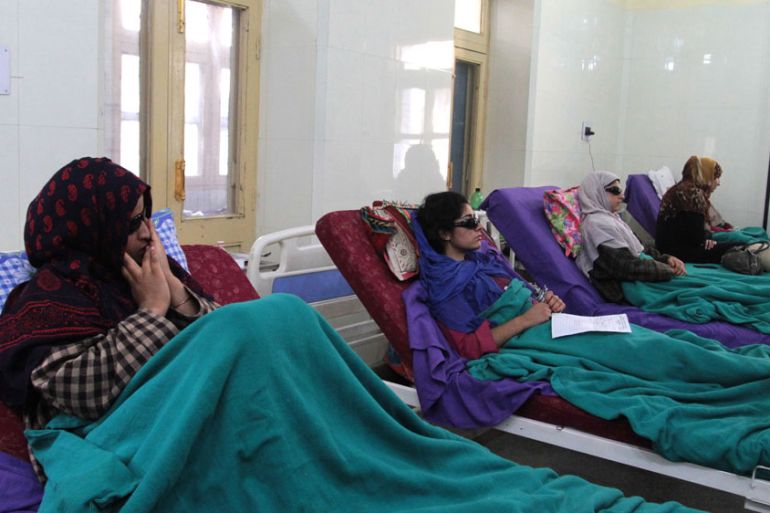Scarred by pellets, Kashmir girls face uncertain future
Families in shock after girls, as young as 13, hit in the eyes with lead-based pellets in Indian-administered Kashmir.

Inside the ophthalmology ward at the Shri Maharaja Hari Singh hospital (SMHS) in Srinagar, four teenage girls between 12 and 19, lie on parallel beds with their eyes shut.
Hit in the eyes with lead-based pellets, they are the latest victims of the “non-lethal” projectiles used by the Indian troops as a method of crowd control in India-administered Kashmir.
Three of the girls – 13-year-old Ifrah Jan, and two 18-year olds, Shabroza Akhtar and Shabroza Baghat – were hit in the face during protests on Sunday in Rumhoo village, in the Pulwama district of southern Kashmir.
Urfi Rashid, 19, was struck on Monday when she peered out of her home in the village of Chitragam Kalan, in the southern district of Shopian.
On Thursday, Dr Tariq Qureshi, the head of ophthalmology at SMHS, told Al Jazeera that he had conducted primary surgery on all four. He is optimistic about the girls regaining their vision.
“The condition of all the four girls has improved. They have vision. We are waiting to see the improvement, and then we will see if they need secondary surgery. But they are not blind,” he told Al Jazeera.
The families are still in a state of shock.
“Pellets are inside her head as well,” Akhter’s mother, Rafika told Al Jazeera, sitting beside the hospital bed.
“You need to be able to see for every type of job or work. She was very bright. I don’t understand what happened to her.”
Similarly, Rashid’s mother, Maryam Begum, 42, told Al Jazeera that her only concern was her daughter’s eyesight,”I am only praying that she should be able to see again,” Begum said, from the hospital.
“If she was hit in any other part of body, that wouldn’t have been this difficult,” she said.
“She was not pelting stones or protesting. She is a girl and has a long life ahead. My husband is a simple farmer, it’s a very difficult situation for us in every way.”
Police officials said in a statement that they had cordoned off a village in Pulwama District on Sunday morning to conduct a search. They said they discharged pellets after they were attacked by a mob.
“A huge mob assembled and pelted stones on the security forces camp. The reinforcements was sent to the spot. In this incident some persons as well as security forces including three officers were injured.”
Locals allege that after the incident, troops went on the rampage, entering homes and breaking property.
Al Jazeera was not able to reach the police for comment about these allegations.
 |
| Shabrooza Bhagat, 18, was lying on the road for 20 minutes until her brother saw her and took her to hospital on his bike . [ Shuaib Masoodi /Al Jazeera] |
More than 90 people have been killed and some 12,000 injured in clashes with Indian armed forces since the killing of a popular rebel leader in July.
Kashmiris took to the streets demanding an end to Indian-rule culminating in a series of running battles between riot-police and stone-pelting protesters.
When 13-year-old Jan was taken to hospital on Monday, officials said she became the 980th person to be admitted for pellet injuries to that hospital alone, since July.
On October 30, the Greater Kashmir newspaper reported that 1,631 civilians had been hit in the face, including 1,100 with injuries to their eyes, since July.
The use of pellets have been heavily criticised by human rights groups, including Amnesty International.
In August, the Indian government said they would be reviewing the use of pellets, while a spokesperson for the Jammu and Kashmir government told Al Jazeera that the weapons would be phased out. But they are still being used.
The victims and families say none of them was involved in the protests. Jan’s aunt, Rubeena, called the incident “barbaric” and said the 13-year-old was “too young to understand what happened”.
“It seems they’ve done with hitting boys with pellets now their targets have turned to young girls, it was like a storm for us,” Rubeena said. Likewise, Akhtar complained: “[When] boys are hit, everyone has an excuse that they pelt stones [but] what did we do?”
Kashmir has been divided between India and Pakistan since independence from Britain in 1947.
Both claim the Himalayan territory in full and have fought three wars over the mountainous region, which remains one of the most militarised regions on earth.
Kashmiris demand that a referendum take place to let them decide on their future.
Tens of thousands of people, mostly civilians, have died since 1990.
![Shabrooza Akhtar’s mother Rafiqa Banoo says when news spread that the army was entering homes, villagers came out to protest. Akhter was hit on the lawn outside their house [Shuaib Masoodi/Al Jazeera]](/wp-content/uploads/2016/11/5d69e5f3cbd54927b926cf777d8a30bb_18.jpeg)